Advanced Visualization Laboratory: Data Visualization for Outreach, Education and Entertainment
Location: NCSA 1005
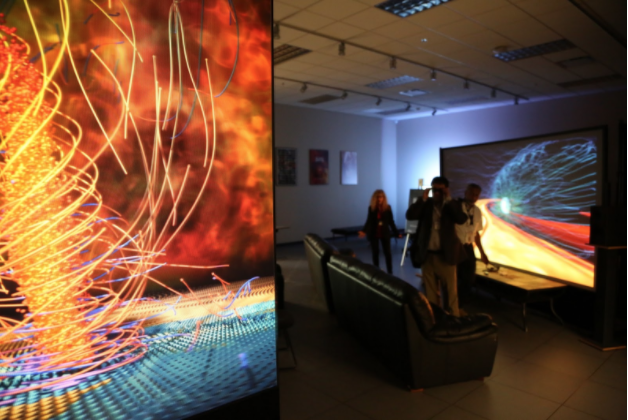
Description: Established over 14 years ago, the Advanced Visualization Laboratory’s (AVL) mission is to communicate science and inspire audiences to learn about science through the creation and integration of data visualizations into public outreach projects. Working in close collaboration with domain scientists, AVL creates high-resolution, cinematic, visualizations of scientific data. These visualizations provide insight into computational science—a key method of contemporary science. AVL shares its work with the world through shows featured in digital full-dome planetariums, IMAX theaters, and documentary television.
Credits: Donna J Cox, Kalina Borkiewicz, Jeff Carpenter, AJ Christensen, Stuart Levy and Robert Patterson
RIVEEL3D: Virtual Reality Archeological Tour
Location: NCSA Room 1005

Description: “RIVEEL3D” (Realtime Immersive 3D Virtual Environments for Education and Learning) is a Virtual Reality Archeological Tour. It invites users to explore historically recreated environments and inspect 3D scanned cultural artifacts using the HTC Vive. The team’s ultimate goal is a methodology for acquiring, cataloging, viewing, and analyzing archaeological data within a virtual environment, preserving excavation sites for the future.
http://avl.ncsa.illinois.edu/realworld-software/riveel-3d
Credits: The Cyprus Institute, Science and Technology in Archaeology Research Center, Department of Antiquities, Nicosia Municipality, Donna J Cox, Kenton Guadron McHenry, Bob Patterson, AJ Christensen, Stuart Levy and Colter Wehmeier (University of Illinois, Urbana-Champaign, National Center for Supercomputing Applications, AVL)
Critical Technology Studies Lab
Location: 2107

Description: Foregrounding technology as an object of study in and of itself, Critical Technology Studies at NCSA (CTS) seeks to examine how computation and data methods, code and software, platforms and networks reflect and refract societal norms and assumptions about human subjectivity, identity, progress, inclusion, labor, play, and the acquisition and circulation of knowledge. Its core focus is to consider how humans are engineered and disrupted by software and how software is disrupted and engineered by humans.
Credits: Ben Grosser, Jodi Byrd
Interactive Multi-Media Ecologies
Location: NCSA Room 2103
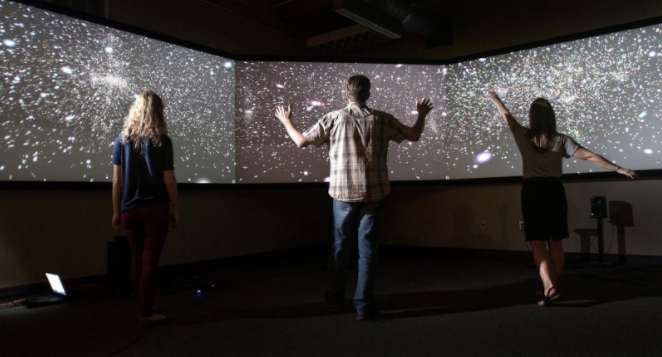
Description: A series of multi-media art installations that incorporate the observer’s movement into a visual and sonic atmosphere, creating a dynamic, feedback artistic ecology. By gathering and analyzing a variety of movement features, elements of the installation ‘react’ to the observer, relaying imagery and audio throughout the environment. As the observer moves and reacts within the space, they become integrated directly with the visual and aural elements, creating responsive feedback ecology.
Credits: Michael Junokas and Greg Kohlburn
Experimental Media Arts Lab (XMAL)

Description: XMAL (Experimental Media Arts Lab@NCSA) is a prototype space for developing collaborations across NCSA and Media and Cinema Studies. XMAL focuses on the intersection of critical media and data studies, storytelling and algorithmic literacy, art and technology. It is a part of the Critical Technology Studies Group in the Culture and Society thematic area of the NCSA.
Credits: Veronica Paredes / Department of Media and Cinema Studies
Pop-Up MobiArte (Mobile Interactive Art Experiments) Event
Location: NCSA Room 1005/2103
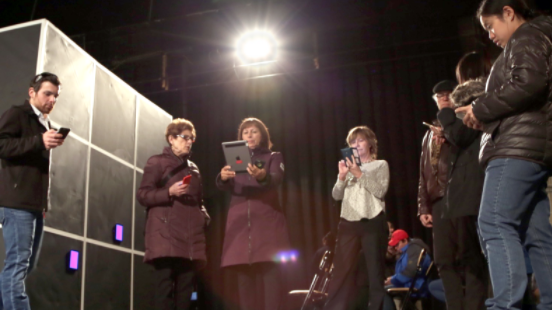
Description: Experience this pop-up MobiArte event where the mobile device is the agent of theater’s future. Participants will be the performers in this event, which uses the information delivery platform developed at the Laboratory for Audience Interactive Technologies (LAIT). LAIT’s mission is to 1) create a new type of theatrical experience for the 21st century, 2) provide an experimental platform for industries to develop applications for entertainment and informational use.
Credits: John Toenjes, Tony Reimer, LAIT
Recovering Prairie Futures
Location: NCSA Room 2107
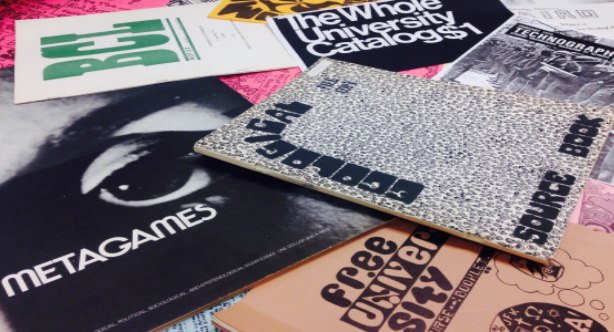
Description: Prairie Futures explores the Midwest’s layered innovation histories that have often been overshadowed by “dominant” regions and centers of computing. It sheds light on inter-disciplinary digital developments in the Midwest – from accessibility design, to educational and public computing, and electro-acoustic design – that necessarily bridged expertise from social sciences, natural sciences, engineering, and humanities; and that have frequently been overlooked, even as they played roles in shaping disciplinary imaginaries, global markets, and ecologies.
https://publish.illinois.edu/prairiefutures/
Clowder: A Research Data Management System
Location: NCSA Room 1005
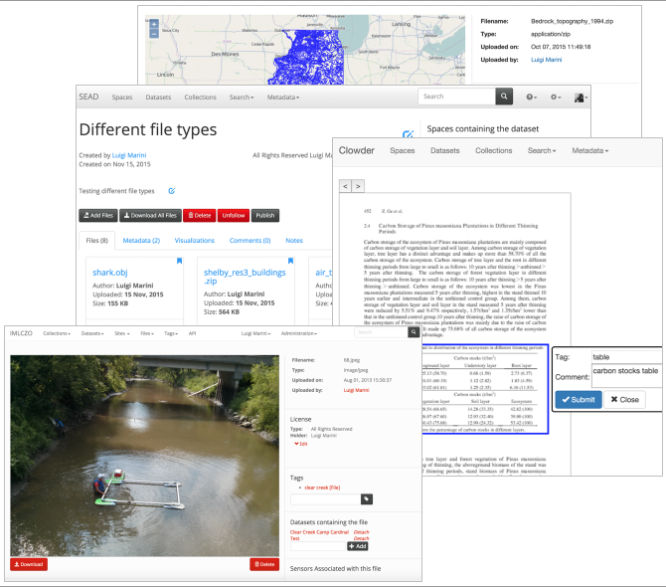
Description: Clowder is an open source web-based data management system designed to support multiple research domains and their diverse data types. It supports preprocessing, processing, and previewing of data, in addition to data sharing and organizational functionalities. When new data gets added to the system, preprocessing serving as a form of auto-curation is offloaded to cloud-based extraction services that process the data to extract appropriate metadata and optionally generate additional data/visualizations. Complimented by a number of features supporting community-based social curation, the combined user, and software-generated metadata is then presented in the Clowder web interface for data exploration by the user.
https://clowder.ncsa.illinois.edu/
Credits: Luigi Marini, Rob Kooper, Indira Gutierrez, Max Burnette, Yan Zhao, Todd Nicholson, Constantinos Sophocleous, Sandeep Satheesan, Michal Ondrejcek, Kenton McHenry (University of Illinois, Urbana-Champaign, National Center for Supercomputing Applications, Innovative Software and Data Analysis)
Using Wearable Sensors and Affective Diaries to Document How Violence Affects Public Life and Public Health
Location: NCSA Room 1005
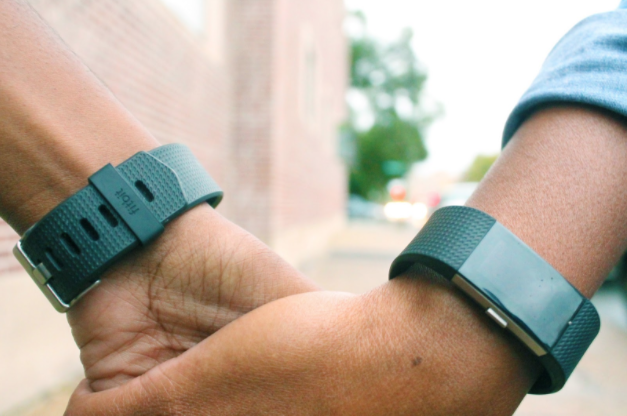
Description: Violent crimes such as shootings affect public life and health in the “hidden America”. We are working with African American mothers to collect data showing how exposure to community violence affects their health; this will empower the community to organize around changes in health and public policy more broadly. To understand the short-and long-term impacts of nearby gun crimes on the health and well-being of African American mothers, we are developing an affective diary platform. The platform will combine real-time crime data from the City of Chicago with visualizations of mothers’ physical movements as collected by their smartphone’s GPS and physiological data collected from wrist-worn wearable biosensors.
Credits: Ruby Mendenhall, Kiel Gilleade, Christy Lleras, Malaika McKee, Subhashini Srinivasan, Margaret Browne Huntt, Meggan Lee, Liudmila Sergeevna Mainzer, Shaowen Wang, Jacob Reed, David Bush and Tonika Johnson
